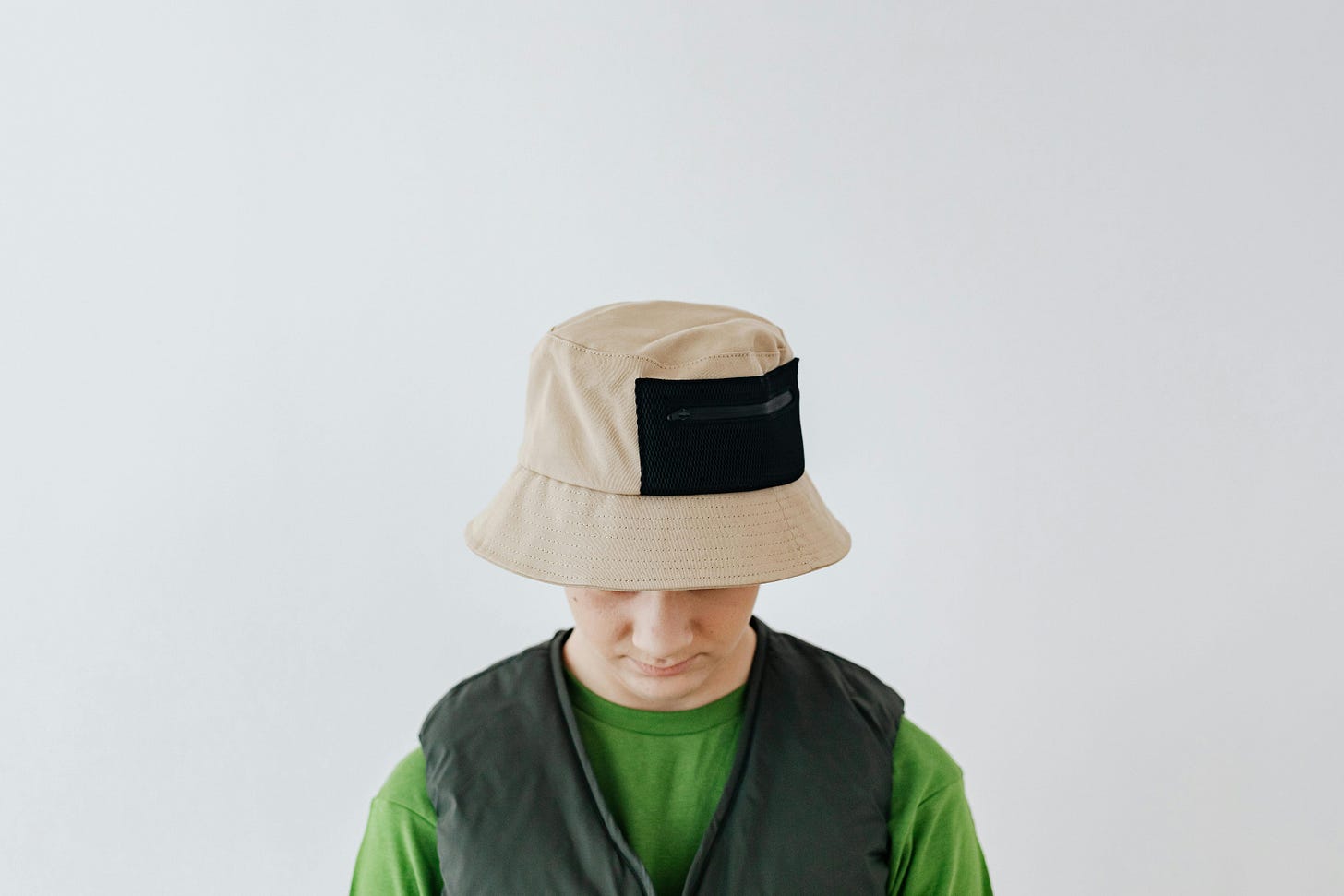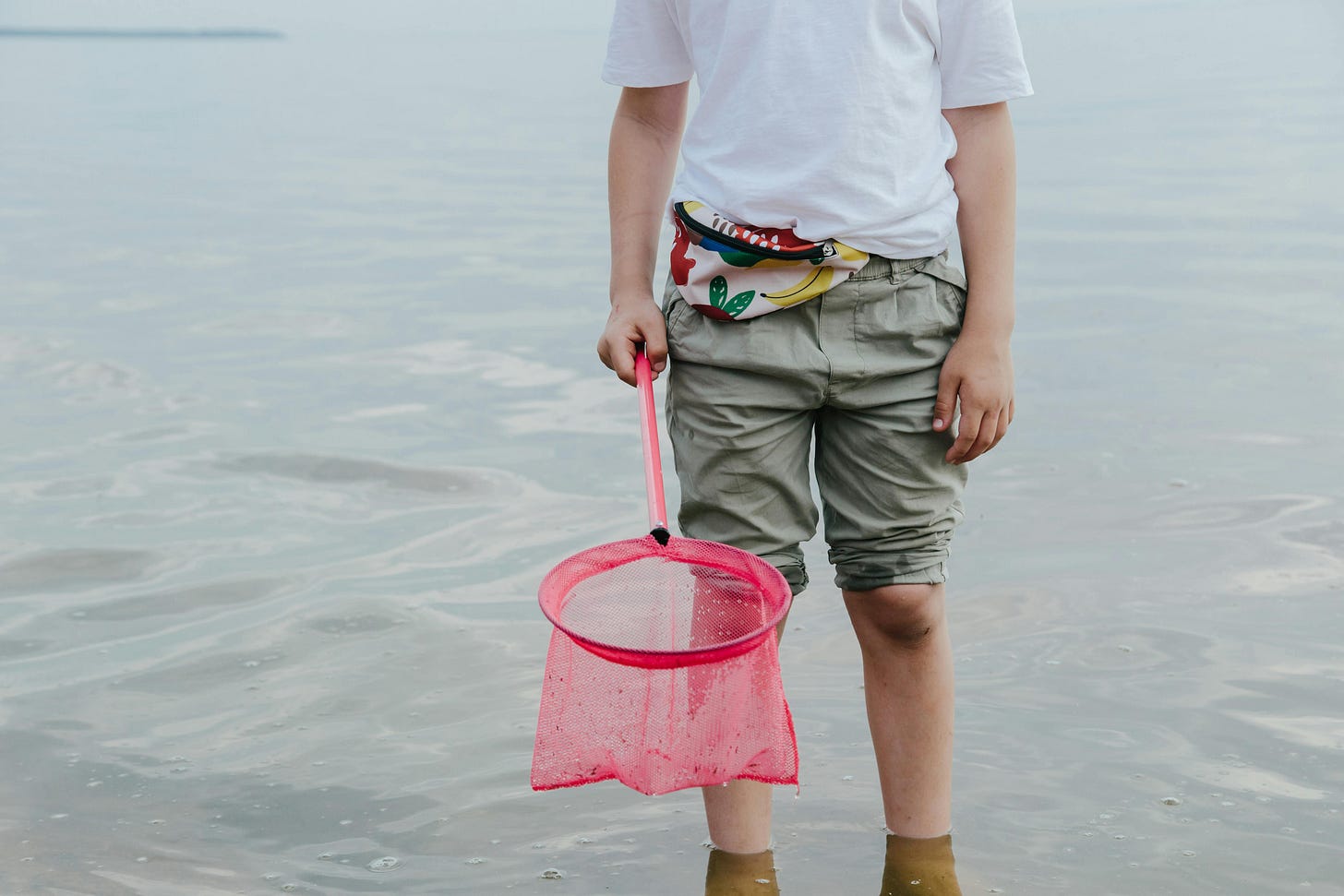
I wore a hat all day, every day when I was in eighth and ninth grade. During the school year, it was a floppy newsboy’s cap – denim in eighth grade, tan vinyl in ninth grade. I wore it to hide and to call attention to myself at the same time, without knowing which I preferred. That age is the worst, anyway. It’s when everything your parents taught you about being a nice girl, all the care they took in shaping a safe and gauzy world, slams into reality – a jagged reality, perhaps of their own making, that they’re desperate to keep you from. My parents had separated half my lifetime ago, but we soldiered on pretending to be a family.
Being a nice girl, as far as I could see, meant keeping the waters calm, never breaking the surface to see what might be swimming around underneath. What swam below my own surface tended to seethe and roil. I wasn’t too good when it came to people and communicating. I kept to myself. I wore my hat; that felt safe. It gave me a fixed identity. It helped me to keep things in line when life threw crazy turns at me.
Summers on the Rhode Island coast, my newsboy’s cap gave way to a Gilligan-style bucket cap. It was lightweight but stayed on in the wind, which was necessary on our little Boston Whaler.
The boat was a miracle. I’d putter until open water beckoned me to gun the motor. A second would pass, two, then the prow would rise, and the boat would surge. The breeze salted my skin, the engine hummed beneath my bare feet, and the sun shone down and batted light back up from the water, making me blink and squint, especially when I took off my goggle-thick glasses to dry them on the edge of my T-shirt.

One Friday when I was cranky and crampy with my period, we were expecting Dad from New York for the weekend with my godmother, Mary, who wore pearls and never ate pizza because she didn’t touch food with her hands. Like my father, Mary was someone to whom I had nothing to say; all the grit and mess of my life had to be jam-packed under a proper veneer in her presence.
Surely, Mary had never had a period. If I even mentioned to her that I had cramps, it seemed to me, she’d swoon with the vapors.
That afternoon, I escaped to the boat. The ropes untied easily. When I turned the ignition, the motor revved, but then gasped like an asthmatic duck. I pulled out the choke to flood the engine and tried again. This time, there was only a gurgle.
“Having a problem?”
A barefoot blond boy stood on the dock appraising me from beneath unruly bangs. His white shorts hung loose around gangly legs, which were tan and had little golden hairs springing from them, and he wore a green T-shirt emblazoned with a dancing Snoopy. I frowned at him. Why had he noticed me? He wasn’t supposed to. Strangers made me uneasy, in particular strange boys, who seemed to speak a foreign language. But boys knew boats.
“I can’t get the motor started.”
He squinted at me. He was my height but perhaps twenty pounds lighter, and reedy, a quiver away from body hair and a baritone. I was almost fourteen; I took him to be twelve.
“I’ll start it for you.”
I eyed him. “Would you?”
“Sure, but you have to let me drive it.” His hazel-green eyes met mine, and I sensed intention beneath his friendliness. His eyes slithered to the side, taking in my craft.
He put me off. Still, he was a child, he seemed harmless, and he said he could start my boat. He jumped in when I nodded.
“Just a short trip,” I said nervously as he jiggled the choke and the motor roared. “We have guests coming.”
He put the engine in reverse. I gripped the sides of my seat. Who was this kid? His ease and command unnerved me. It was my father’s boat; it had taken me forever to convince Dad to let me handle it on my own, and now I’d handed the keys over. What was the boy’s name? He hadn’t asked mine. My arms crossed and I tucked my fists into my armpits.
“It’s my boat, you have to let me drive.” My voice was high and tight.
He glanced at me through slitted eyes, then turned his attention back to the water.
“On the way back,” he said calmly.
A gust of wind swept under the brim of my hat, nearly hoisting it off my head, and my heart leapt. I grabbed it by the crown and pulled it firmly back in place.
The boy silently navigated under a low bridge onto Potter Pond. The sharp salt air gave way to a marshy loam. He shrugged when I asked him where he was going. In less than ten minutes, he guided us into an inlet and dropped anchor near a forested bit of land. “Want to go up here?” he asked laconically, pointing up a sloping green. “There’s something I want to show you.”
Keep reading with a 7-day free trial
Subscribe to Ocean in a drop to keep reading this post and get 7 days of free access to the full post archives.




